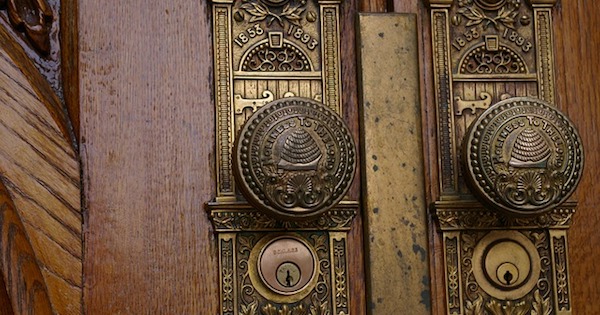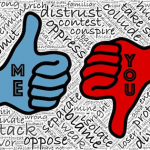
PATRICK Q. MASON, Chair of Mormon Studies at Claremont Graduate University: Thanks for your patience, dear readers. John and I have both received so much positive feedback from our earlier posts, which has been quite gratifying. I have to apologize for our long hiatus. Late in the fall I took on new responsibilities as Dean of the School of Arts & Humanities at Claremont Graduate University, in addition to maintaining my position as chair of Mormon Studies there, and I simply didn’t have any extra time to do this. I’m just now coming up for air, and while I can’t keep up the weekly pace that we had done before, both John and I feel that this is important enough that we didn’t want to abandon it completely. So we’re going to scale back from writing weekly to posting monthly, with occasional variation. Hopefully what we lack in quantity we’ll make up for in quality conversation!
JOHN P. DEHLIN, CEO of the Open Stories Foundation, founder of Mormon Stories Podcast: Welcome back, Patrick, and to our dear readers as well! I am so happy to see this important conversation continue. And congratulations on your new promotion. So well deserved!
If you’d like, I would love to re-engage in our conversation with a discussion of your thoughts on boundaries within LDS church membership.
When I talk to many of my questioning and/or post-Mormon friends who experience a Mormon faith crisis, many of them feel as though once they lose their faith in Joseph Smith, the Book of Mormon, or polygamy (for example), they must leave the LDS church altogether — not only for integrity’s sake, but also because it is their perception that there is no place within the modern LDS church for semi-believers, or for non-believers.
So here is my question to you: Do you think that there is a place in the modern LDS church for a member who does not believe in fundamental LDS church teachings such as: (1) an anthropomorphic God, (2) the literal resurrection of Jesus Christ, (3) that the LDS Church is the “one true church,” (D&C 1:30), (4) that the Book of Mormon is historical, or that (5) polygamy is one of God’s eternal laws (D&C 132) – but who still wants to remain a member in full standing (e.g., continue to hold a temple recommend, participate in priesthood ordinances, hold callings, etc.)?
If you believe that there is a place for such people, I would be curious to understand your view on how one might maintain this position (of non-literal or non-belief — and retaining LDS church participation) while still not violating their own conscience, and feeling fully welcomed by church leadership. Do you sense that LDS church leadership even wants such members to continue participating in good standing?
Patrick: Lots of questions there.
In a word, yes, there is absolutely a place in the LDS Church for people with divergent doctrinal views on all the specific points you mention, and many more.
A little context. Mormonism has always been a doctrinal religion. Historically it emerged at a point in American religious history when doctrine mattered an awful lot to most people. For lots of reasons — and I think the most accessible account of this historical process is Stephen Prothero’s book Religious Literacy — the degree to which most people know and even care about doctrine has declined substantially over the past century. There are some churches that are the exception to that rule, however, and Mormonism is one of them.
(As an aside, I think this is one of the LDS Church’s biggest challenges to its missionary program, especially in Europe and America. Mormon missionary work is still heavily doctrinal, but the vast majority of the population is post- or anti-doctrinal, so the missionaries are selling something that most people don’t want anymore. My own view is that people would be far more interested in other aspects of the church, and that doctrine could get loaded in later. But I digress.)
I seem to be arguing against myself here — saying that Mormonism is a highly doctrinal religion, but that there is room for doctrinal diversity. I think both statements are true. Exhibit A is the temple recommend interview itself. It is most definitely NOT an interrogation about doctrinal mastery or even orthodoxy. There are a small handful of questions exploring a person’s belief, but they are quite broad, and deliberately so, I believe. They simply ask if you believe in the Godhead (not asking what you think about God’s body or the resurrected Christ’s body), and whether you think the church is led by a prophet called by God who is authorized to exercise priesthood keys. Nothing about the Book of Mormon, nothing about the “one true church,” definitely nothing about polygamy. The vast majority of the interview is about orthopraxis, not orthodoxy — concerned with a person’s fidelity to a series of moral and covenantal commitments. I might go so far as to say that the temple recommend interview reveals that the church is more interested in regulating a person’s lifestyle than colonizing their mind.
Nevertheless, we know from polls that the majority of active Latter-day Saints tend to agree about doctrinal matters. They know the church’s official doctrines, and by and large they believe them. The church spends an enormous amount of time and energy in teaching the doctrines in a way that actual discussion or debate about doctrinal matters is generally discouraged. (Plenty to talk about in terms of LDS pedagogy, but that will have to wait for another time.)
Given this learning environment and a general culture of doctrinal conformity, it’s only natural that individuals who have come to different conclusions than other people about the “right answers” often feel uncomfortable and even unwelcome. Some church leaders (local and general) are doubtless more open to doctrinal divergences than others. Generally the issue is less what you think than what you say, though to many that understandably feels stifling. To some degree this is a function of Mormon culture, but it’s also true in lots of other social and cultural settings — just ask any conservative working in academia (if you can find one).
A few years ago, I wrote a Patheos column provocatively called “In Praise of Cafeteria Mormonism.” I still believe what I wrote way back in 2013, and it may be helpful to review, though I won’t summarize it here. Bottom line is that I do think a person’s beliefs can clearly place them outside of Mormonism. It’s hard for me to imagine, for instance, a Mormon who is convinced there is no God, or that Jesus Christ is in no way divine, or that Joseph Smith and all his successors are complete frauds. I’m okay at that point with someone calling themselves a cultural Mormon, or something like that, but membership in the Church of Jesus Christ of Latter-day Saints does bring with it at least a bare minimum of truth claims, IMHO. Still, within the boundaries of the temple recommend interview, I think there’s room for a pretty healthy amount of diversity.
Does this resonate with you? I know lots of people will say that after expressing divergent views they’ve been shut down, or shamed, or called to repentance by a bishop or visiting teacher or general authority or whomever, and that’s a pretty tough thing to process or get over. But what prevents someone from simply owning their own Mormonism, within the broad outlines that the temple recommend interview lays out?
John: Patrick — Your thoughtful response fills me with many mixed and strong emotions.
On the one hand, it also seems true to me that the importance of religious doctrine is in decline in many regions worldwide — including within Mormonism. Personally, I remember how important and/or exciting many Mormon teachings were to me when I was a believer, including:
- That my friends and ancestors who died without a Mormon baptism could be baptized after their death in a Mormon temple,
- That my family would persist into the next life, and
- That I could become a God some day.
Those teachings were thrilling to me (at the time).
But I also remember feeling deeply conflicted by other Mormon doctrines:
- That the Mormon church was the only legitimate church on earth (D&C 1:30),
- That Native and African-Americans were cursed by God with dark skin (2 Nephi, 5:21),
- That God did not want women to lead the church,
- That I would be required to be a polygamist in heaven (D&C 132:61), and
- That same-sex marriage is an act of apostasy, and that the children of same-sex married couples are not welcome in the Mormon church.
These latter doctrines seem(ed) actually harmful to me, and became untenable over time. Consequently, it has brought me a small amount of comfort over the past decade to see the Mormon church backpedal away from some of these doctrines, likely due to the influence of the Internet. (For a great read on how many Mormon doctrines have changed over the years, I highly recommend Charles Harrell’s book, This is My Doctrine: The Development of Mormon Theology.)
And while this doctrinal backpedaling seems to be positive in some respects, I believe you are correct that within Mormonism, many distinctive Mormon doctrines continue to matter — a lot.
That was my own experience when I became public about my doubts regarding an anthropomorphic God, the literal resurrection of Jesus, or the historicity of the Book of Mormon — or when I became publicly supportive of same-sex marriage and of female ordination. Within a very short time of sharing these views publicly, I was hauled into my bishop and stake president’s offices, grilled about my unorthodox position on each of these teachings — and ultimately was told, very explicitly, that I could not remain a member in good standing with these doubts and doctrinal positions. I was told that I either had to stay silent about them, or I would be excommunicated (which was my fate in 2015).
In addition to my own experience, I have many friends who have received similarly harsh and punitive treatment by Mormon leaders for expressing doubts or disbelief about the very issues you claim are acceptable under the Mormon “Big Tent,” including Jake and Amy Malouf who were harassed and disciplined for supporting same-sex marriage, Kirk and Lindsay Van Allen who were harassed and disciplined for openly expressing disbelief regarding the doctrine of Mormon polygamy (yes, many active Mormons still believe in polygamy, and it remains doctrinal), and Marisa and Carson Calderwood were excommunicated for doubting that Joseph Smith was God’s prophet, that the Book of Mormon is an ancient record, and that the Mormon church is God’s “one true church.”
And these cases are not isolated. I have personally spoken over the years with hundreds of Mormons who have been threatened with excommunication or officially disciplined for posting doubts and concerns regarding central Mormon doctrine on Facebook, or on other social media.
How do we square these experiences of coercion, control, and rejection with your experience of tolerance and acceptance?
Perhaps the most troubling part of what you wrote (for me) was this excerpt, “Generally the issue is less what you think than what you say.” To this point, I would say that this is an incredibly sad reality for many to face. Yes, modern Mormons are “allowed” to have doubts or alternative views, but for the most part they are forced to remain silent about these views or face the risk of punishment, public shaming, and possibly excommunication from the church.
To me, a Christian church that silences people with fear and intimidation does not exhibit the virtues of Christ.
You are correct that occasionally a local liberal leader will emerge who shows flexibility on these points, and is willing to turn their head at unorthodoxy (so to speak), but the inconsistency of enforcement is also deeply troubling for many….and is unjust at a fundamental level.
As I close this part of the discussion, I also cannot help but wonder what the purpose of Joseph Smith’s ministry and martyrdom was — if so many of his distinctive teachings are to be slowly whittled away from the church’s modern doctrinal canon. Whether it be the central narrative of the Book of Mormon (that Native Americans descend from a cursed people), or Joseph’s canonized teachings regarding the “new and everlasting covenant” of plural marriage (a doctrine for which he ultimately died), or the doctrine that men and women ultimately become Gods — my formerly-orthodox-brain can’t help but wonder what Joseph Smith lived and died for — if so much of his central doctrines are to be whittled away from the church he founded. Would Joseph Smith even recognize the church that he founded (in a doctrinal sense)?
As you can see, your response struck me in very personal way. I apologize for the heat. I hope we can explore these matters more in depth over the coming weeks and months, and I sincerely appreciate you providing a place for us to acknowledge and work through these issues.
To keep our posts at a manageable length, this conversation will resume next week with Patrick’s reply.










